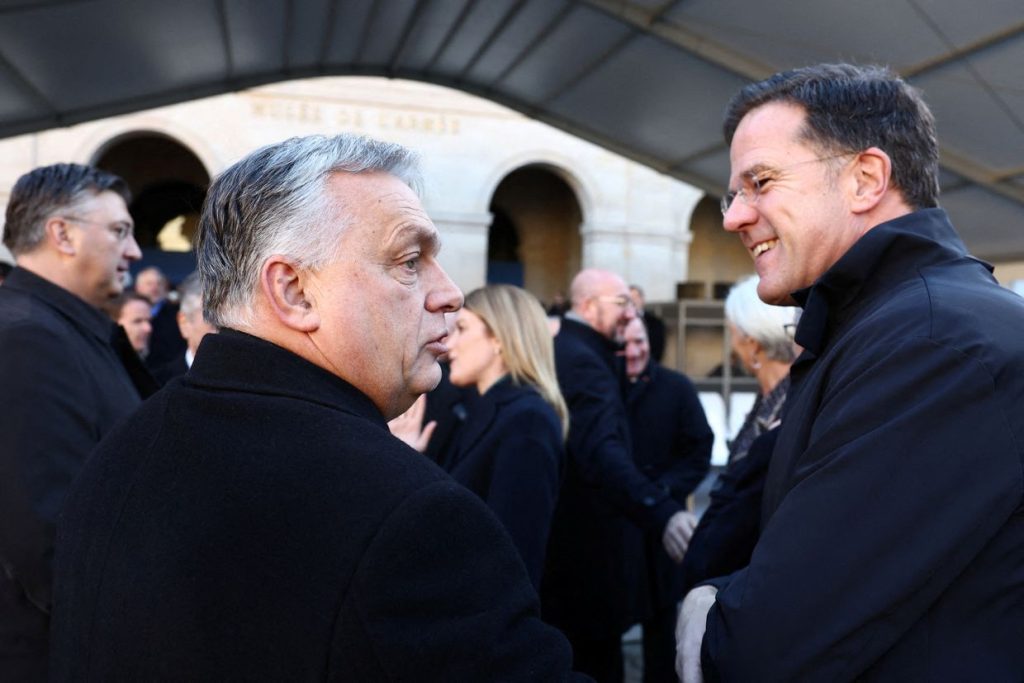Hungarian Prime Minister Viktor Orban announced his endorsement of Dutch Prime Minister Mark Rutte’s bid to become the next Secretary General of NATO. Orban made this decision after Rutte expressed his support for Hungary opting out of NATO initiatives to support Ukraine. This announcement came after incumbent NATO Secretary General Jens Stoltenberg visited Hungary for talks with Orban, where Hungary had expressed concerns about future plans to support Ukraine. Orban assured Stoltenberg that Hungary would not take part in any initiatives supporting Ukraine but would not block them either. Rutte and Orban met in Brussels on June 17, where Rutte confirmed his support for Hungary’s decision, leading Hungary to support Rutte’s bid for Secretary General.
NATO allies have yet to reach an agreement on a long-term financial pledge for Ukraine, according to NATO Secretary General Jens Stoltenberg. This statement came after a two-day meeting of the alliance’s defense ministers in Brussels. Despite ongoing discussions within NATO about supporting Ukraine financially in the long term, there has not been consensus among the allies. Hungary’s decision to opt out of supporting Ukraine through NATO initiatives has raised concerns about the future of support for Ukraine within the alliance. Rutte’s endorsement of Hungary’s stance has further complicated the situation, with some NATO members expressing support for Rutte as Stoltenberg’s successor and others still undecided.
Orban’s announcement of his support for Rutte’s bid for NATO Secretary General came after he confirmed Rutte’s backing of Hungary’s decision to opt out of initiatives supporting Ukraine. This decision has sparked discussions among NATO members about the future of support for Ukraine within the alliance. Despite ongoing efforts to reach an agreement on a long-term financial pledge for Ukraine, NATO allies have not yet come to a consensus. Orban’s endorsement of Rutte and Hungary’s stance on supporting Ukraine through NATO initiatives has further highlighted divisions within the alliance and raised questions about the future direction of NATO’s support for Ukraine.
Slovak President Peter Pellegrini also publicly backed Rutte’s candidacy for NATO Secretary General on June 18, joining other NATO members in expressing support for Rutte as Jens Stoltenberg’s successor. With 29 NATO members already backing Rutte, Hungary, Slovakia, and Romania were among the remaining holdouts. Stoltenberg’s visit to Hungary and subsequent discussions with Orban highlighted the challenges facing NATO in reaching a unified stance on supporting Ukraine. Despite the complexities and divisions within the alliance, efforts are ongoing to find a way forward and ensure continued support for Ukraine within the NATO framework.
The endorsement of Dutch Prime Minister Mark Rutte for NATO Secretary-General by Hungarian Prime Minister Viktor Orban has underscored the ongoing debates and disagreements within the alliance over support for Ukraine. With NATO allies yet to reach an agreement on a long-term financial pledge for Ukraine, the future of support for Ukraine within the alliance remains uncertain. Orban’s decision to support Rutte’s bid for Secretary General after Rutte expressed backing for Hungary’s position on supporting Ukraine through NATO initiatives has further highlighted the challenges facing NATO in addressing this issue. As discussions continue within the alliance, efforts are underway to find a path forward and ensure that NATO remains unified in its support for Ukraine in the face of external challenges and internal divisions.


